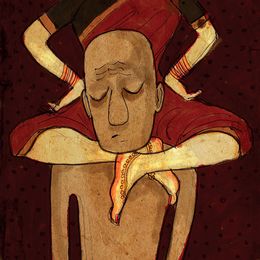India’s skewed sex ratio means men outnumber women. So, if a political Hercules could mobilise them on the basis of gender, men would constitute the country’s largest-ever vote bank.
In the 1980s, a group of men sought protection from legal harassment after pressure from women’s groups brought about stricter anti-dowry laws. The men, who claimed to be victims of dowry-related harassment, sat on a dharna in front of Parliament demanding a law to protect men. But, neither the political class nor the media took them seriously. In fact, as this determined group tried amusing tactics like shaving their heads, writing long poems of lament and sending petitions written in blood to the United Nations, they became the laughing stock of the country. The courts, too, laughed their grievances off. The movement, if it can be called so, petered out, and male angst about discrimination remained an off-colour topic.
Since the 1980s, male lawmakers have been receiving longwinded petitions from male rights activists, who insist that men are being discriminated against by laws meant to protect women. Those activists have now found two champions of their cause. Both of them are BJP MPs from Uttar Pradesh, where dowry, rape and sexual harassment cases have been on the rise.
MPs Harinarayan Rajbhar and Anshul Verma are backing demands for a national commission for men, which would function like the National Commission for Women, the apex commission in India for protecting and promoting the interests of women. Though the proposed national commission is meant for all men, Rajbhar wants the prime focus to be on husbands who are harassed by wives or are arrested on charges of demanding dowry. Rajbhar wants the commission to punish women who file false cases against men. He feels that the police, in such cases, are forced to act because of the strict legal provisions that include denial of bail for the accused.
Angered, women’s groups say the MPs have lent a hand to a sexist and misogynist proposal that diverts attention from the plight of women in an aggressively male-dominated society. The groups suspect that the proposal is intended to play on the widespread apprehension among male politicians regarding the demands for reserving seats for women in Parliament and legislative assemblies.
The chain of commissions to safeguard interests of specific groups, however, has only been growing since the adoption of the Constitution. The Constitution had mandated the setting up of national commissions for scheduled castes and scheduled tribes, but now there are commissions for backward classes, women and children. There are demand for setting up more commissions to tackle issues of more specific groups. Kerala has set up a commission for forward communities, which has resulted in copycat demands in other states.
There is growing resistance and resentment as governments and courts open up institutions that were traditionally male bastions. The ban on triple talaq struck a strong blow for women’s rights; as had the opening up of a Hindu temple and a Muslim dargah in Maharashtra for women worshippers.
The Supreme Court, however, has also come to the aid of men (husbands) and women (mothers- and sisters-in-law) who were falsely implicated in dowry cases. Still, Rajbhar is not impressed. He feels that scheming and spiteful women are trapping innocent men. While such cases may indeed exist, Rajbhar’s fears of a war of the sexes seems farfetched.
sachi@theweek.in


